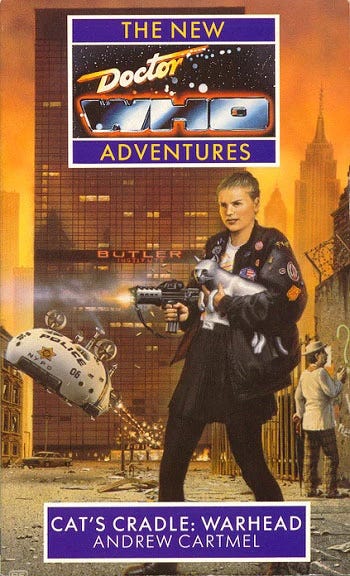Published: April 1992
Read: February 2021
Revelation I read because it was so influential on what was to come: this one I chose because it was an insight into the past, written as it was by Andrew Cartmel, who as script editor was effectively showrunner of the last three seasons of the original Doctor Who.
No way is this book two in a trilogy: except for the presence of a silver cat in a couple of scenes there are no links backwards or forwards.
This is really pushing at the edges of what is appropriate as Doctor Who. Not just the famous, and famously awkward, scene with Ace naked and tending to Vincent in the bath, but the devastated, hopeless world; the villain who’s planning to kill his own child and transfer his mind into a computer, explaining his plan to his wife, and we only find out at the end of the scene that she killed herself before the scene began; the minor character who tortures kids for a laugh; the hints that something terrible happened on the west coast of the US… I can see both why this was kind of exhilarating as an attempt to push the boundaries, and also why it put people off.
In plot terms it’s amazingly simple; so much of it is set up and world-building. If you shaved the set up right down to a couple of scenes, then started with Ace in Turkey, you could easily get through all the key beats in a McCoy era three-parter. Also the Doctor and Ace are written exactly as they were on screen - Ace is a bit older and more explicitly sexualised, but her dialogue is all stuff you could imagine Aldred saying, and it ends on a moment so like the final moment of a load of TV stories that you can almost hear the credits rolling (“It’s served its purpose”).
Cartmel’s vision of the near future is basically impossible to reconcile with the real world as it developed, or much of the rest of Doctor Who come to that. The big thing he fails to predict is the internet which surely already existed, albeit on the margins, in 1991-2. A lot of his ultra-futuristic technology looks hilariously primitive - the gun which contains a human mind, but has a three character read out, for example.
So it’s sort of an exciting grotesque, but it is kind of mental that this came from the show’s last script editor. Revelation was shorter, and more fannish in some ways, but it’s also far more novelistic than this. Warhead is edgier, but much more of a cul-de-sac. It doesn’t open the franchise up in the same way.
Next up: Transit.





This almost certainly is less influential on the future than Revelation, but it would’ve felt weird if Who hadn’t done a big cyberpunk steal in the early 1990s.
The prologue to this book is a thing of beauty. Totally Cartmel’s character statement for the Doctor. I also love how the whole thing really comes down to him not factoring in the rogue element of two people falling in love.
There is a blink-and-you’ll-miss-it shot of this story’s Butler Institute in 2008’s The Poison Sky, when the Sontaran gas is being burned out of the atmosphere.
I do understand why you did this, but I think skipping over Time's Crucible seems odd, because if anything, that's the real 'trilogy' - Cornell established the new baseline and Cartmell shows where he might have taken the show in the future if he had had the chance, but it's Platt who pillages the past to create a Gallifrey that does what Chibnall also decided to do - re-examine the bits and pieces of the 'canon' and then rewrite the history wholesale to give a new bunch of 'loose ends' that could be taken up later (and, in the case of Faction Paradox, thrown about with great force.)
So I guess skipping it does make some sense given that, whereas Revelation and Warhead are still largely intact in the retcon game (indeed they may even be more 'canon' than some tv stories!), Time's Crucible has been very much written over (by both Hell Bent and then The Timeless Children/Flux.)